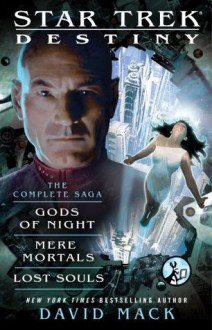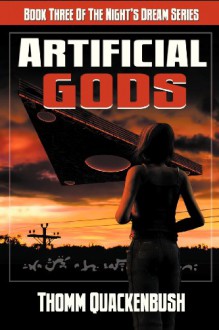
"Destiny" is set more than a year after the events of ST: Nemesis. It builds upon the TNG-relaunch novels, the Titan-series and various other familiar characters - but don't worry, Destiny is quite a good point to get back into Trek without prior knowledge of the mentioned book-series.
Given the split nature of the book that's jumping from one stage to the other, I'm going to follow those jumps in my review.
Enterprise-E
The Federation is at war with the Borg, and the Enterprise is the only ship with weapons that stand a real chance at destroying the cubes. Fear of the Borg adapting, though, stays Starfleet's hand in distributing the transphasic torpedos, based on plans from future-Janeway, to the rest of the fleet. The result is watching while other ships try and mostly fail to defend those planets the Enterprise can't reach in time. And Picard is shocked to find that the Borg, this time, have but one single goal: the annihilation of the Federation.
Having read none of the TNG-relaunch books, I was a bit surprised to read that Picard apparently was retransformed into Locutus - but other than that, this plotline is rather unremarkable. Of course, there's the usual angsting about the Borg, Picard's relationship with them bordering either on obsession or on defeat, but it's nothing that we haven't seen before in TNG. Getting a glimpse of Worf as First Officer wasn't as dreadful as I would have thought since I can't stand him, or rather what has been done to his character in DS9. Discovering that Beverly and Picard finally tied the knot and are even expecting their first child was on the other hand a nice touch - and kind of a couterpoint to Riker and Troi's dilemma. But I very much enjoyed their delight and comfortable relationship which is quite as I expected it, to be honest, as is Beverly's support of Picard even though she's worried about his state of mind. It's interesting to see how much has changed on the Enterprise, yet how much still stays the same. Granted, the main protagonists are still the same and the focus wasn't so much on the new characters around, but the setting on Enterprise-E still resonated well with me, somehow like coming to visit an old friend one hasn't seen in a long time.
Titan
While the actual battle against the Borg centers around the Enterprise, Titan gets unusual readings about possible transwarp-conduits. Their explorations are overshadowed by the personal tragedy of Troi's again failed pregnancy.
This is actually the most thought-provoking plot-thread. Troi and Riker's second attempt at a child fails when Ree diagnoses the child non-viable (but the pregnancy itself's still intact) and recommends (read: urges) Troi to abort the fetus - better even, to let him perform a hysterectomy to prevent any further pregnancies. Troi wants to hear nothing about abortion, miscarriage or hysterectomy, Riker falls into despair, and Ree later on threatens to force Deanna to submit to the operation, or to be called unfit for duty... Well, so far, so good.
Mack walks a fine line, alluding to the ongoing debate about prenatal diagnostics and the pro-life vs. pro-choice conflict. But in my opinion, the whole discussion is more of an academic one since the fetus isn't viable, it will die before birth, there won't be a child born (at least at this point in the story - there are species far more advanced than the Federation who could still intervene...) - and that's the spinning point. The whole dilemma would feel more real if there were at least a chance that Deanna could carry full term and deliver a child, albeit perhaps a child with defects. Then we'd really face the choice of pro-life vs. pro-choice.
It's more the surrounding events that turn this tragic development into something I wouldn't have expected as such in Trek. Granted, the miscarriage could happen at the most inconvenient time, but practically forcing Deanna to submit to an abortion - if not by an actual order then at least by pressuring her into a decision she isn't ready yet? I get that Ree doesn't actually understand what a pregnancy involves, the investment of hope and love, the bond that's forged between parents, and mothers in particular, and the child that's growing in their womb. And of course, the suggestion of an abortion seems sound in this case where there's no hope of a successful pregnancy. On the other hand, he isn't able to treat Deanna properly, he just doesn't get the whole picture - and thus, should have relinquished her care to another doctor on Titan, one who's perhaps better suited to deal with mammal pregnancies.
The other thing I don't quite understand is the haste to perform the abortion. Just the fact that the fetus won't live for much longer doesn't necessarily pose a risk to Deanna. The imminent danger is a miscarriage, accompanied by heavy bleeding... but why should Deanna be at risk of a ruptured uterus? Granted, she could face serious complications had the fetus already died and been left in her womb (i.e. infection) - but that's not the case, at least as far as I understood Ree's explanations. He just reiterated the fact that it wasn't viable - not that it was dead already. This is perhaps the worst diagnosis Ree could give her, especially coupled with the fact that due her first pregnancy and exposure to the radiation Ian exhibited she likely will never be able to bear a healthy child. Deanna needs time to come to terms with not only the loss of this child, but also the idea that her dream of a child won't ever be realized. Actually, I find it appalling that no one is willing to grant her that time of grief and to say good-bye to this child...
I won't really start about the total hysterectomy... This is just a ridiculous notion because it's not her womb that causes the problems. Potentially she'd be able to carry a child to term - just not a child created from her own DNA. It's only her ovaries that are damaged and at risk of developing cancer due to the radiation after all. Even nowadays there are so many possibilities with IVF, why should there be less in the 24th century? Again, I don't think Ree quite grasps the ramifications of his suggestions. On the other hand, doctors have always been quick in suggesting hysterectomies, and the idea that such a procedure, even "only" the removal of the womb, leaving the ovaries in place, seriously disturbs the feeling of self-worth and the self-image of a woman has emerged only in recent years - and still it's not acted upon often enough. In this case, as a preventive measure Ree should have suggested an ovarectomy, a hysterectomy seems a bit of an overkill...
But it's not just Ree that bothers me - it's Vale as well. Her attitude to go behind Riker's back and collaborate with Ree, sorry but that's taking the duty as First Officer a bit too far. Of course, Riker's distracted, that's the problem with having your spouse on the same ship, but in no way did he seem incapable of carrying out his duties in such a fashion that warrants such a move by Vale. Perhaps she, too, didn't quite get what was happening. To her it just seemed as if Deanna went against the rational solution in dismissing Ree's treatment. But she didn't really pause to think beyond the mere physical... because does she really think that Riker and Troi would be back to normal as soon as the "parasite"'s removed?!? And what about removing Deanna from duty till the termination of the pregnancy?!? Why that? Just because of a risk of miscarriage? I mean, come on, then you would have to remove any pregnant officer from duty, because there's always a risk of some complication...
At least the compromise between Deanna and Ree, that she's unwittingly brought about, buys some time... hopefully not for the introduction of some kind of deus-ex-machina solution that circumvents all mentioned conflicts and dilemmas.
And I'm not dismissing the Troi's position in the chain of command. On her decision doesn't solely rest her own well-being, but that of those who could be trapped with her when she goes down due to a possible spontaneous abortion. I understand that Ree has to serve both as Troi's personal physician and the CMO of the ship, it's just the *way* he goes about that with absolutely no sympathy, no consideration at all for Deanna's pain, that's making this situation so difficult to tolerate for me. Is his recommendation of an abortion medically sound? You bet it is. And I'd say given a bit of time to herself without any outside pressure, Deanna would have agreed - and quite soon too.
I could sympathize with both Riker and Troi very well. Troi's denial and anger at herself, Riker and the baby was palpable - as was Riker's helplessness. He just doesn't know how to deal with the situation, he's just human after all. Still, he supports Troi's decisions although he doesn't really understand them. Given that Troi feels everything he feels, his not understanding her is bound to cause a rift - and I'm looking forward whether the two are able to overcome this tragedy with their relationship intact. (On the other hand, Beverly's being isolated on the Enterprise did cause me to think about Deanna's transfering back to the Enterprise. There are after all quite a few other counselors on Titan, but none worth mentioning on the Enterprise... Granted, having to witness a successful pregnancy wouldn't really improve Deanna's state of mind, I guess.)
Other than that, I enjoyed reading about Keru facing his Borg demons and his friendship with Torvig. I'm not sure, though, what to think about Pazlar's being able to project herself anywhere in the ship - but not actually having to go anywhere herself. It's well meant by Ra-Havreii, I'm sure, but she's got to be careful not to isolate herself even further.
Aventine / Columbia
Ezri Dax, commanding the Aventine, in the mean time investigates the relics of the starship Columbia found on some remote planet in the Gamma-Quadrant, hoping to find clues as to what happened more than 200 years ago. The ship might just hold the key to solving the mystery of the Borg's random appearances and the origin of the conduits so similar to the Borg transwarp conduits that were found near attack sites. But then, members of her away-team are killed in a gruesome way by an unknown entity that just might have found its way aboard the Aventine.
Ezri's plot is a rather straight forward fact finding mission. It's interesting to see her in command and removed from DS9 - but what happened to some members of her crew just didn't touch me as much as it probably should have. They were just in the wrong place at the wrong time, and frankly, I simply sympathized with the perpetrator who's been practically kidnapped and left alone after the whole crew of the Columbia died a sudden and horrible death... not that that justifies murder but still...
I welcome, though, the return of Simon Tarses. I understand he appeared in some DS9-relaunch books (I think so at least), but since I haven't read any of the more recent ones, I must have missed that... His dry "You're standing in my blood" had me in stitches, however... medical humour, I guess.
After an attack supposedly by Romulans, the Columbia limps to a relatively nearby planet - only to become stranded there when the Caeliar refuse to let the landing party leave or even establish contact with the ship or Earth in order to stay hidden from the rest of the galaxy. An escape attempt leads to tragic and unforseen consequences.
I wasn't terribly fond of Hernandez or the introduction of the Columbia in "Enterprise", especially the way Tucker used to skip ships just to escape his relationship problems with T'Pol. But with time this plot thread grew on me. It reminded me of Voyager's plight, being far from home, knowing that during your absence life continued and that you may no longer be part of that life once you return. And in this case, it's not just distance that prevents a joyful reunion, but also a planet's inhabitants that while polite and self-claimed pacifists still hold the ship and its crew prisoner. And the dilemma is that I also understand their motivation. Ordinarily they would simply send a ship that comes too close to their planet into the unknown regions of space, sometimes even whole planets - but this time they took the risk of getting to know the landing party, given the poor state of the Columbia... with dire results, because humans just don't like to be put in a cage, even a gilded one, and not all humans share their pacifist attitude but stop at nothing to escape. And that's perhaps the most interesting part of this plot thread. While Hernandez and most of her senior crew share the goal of getting home, they find that not all ends justify the means, unlike the rest of the landing party. While I can't condone the actions of Foyle and his minions, going behind Hernandez, threatening to kill her, torturing a crewmember in order to get the Caeliar to comply with his wishes, at least both positions were fleshed out properly. I'm very curious to see how this story line will continue - and how it will shape the future we all know, especially the emergence of the Borg.
Honorable mentions go to Calhoun and his Excalibur that once again make the impossible possible and defeat a Borg cube without having to sacrifice themselves (like other ships did, and in doing so forced the Klingons to enter into the conflict... think Narendra III). I'd really like to read more about him - but I'm afraid I've outgrown Peter David's writing style, and reading the most recent NF-books felt more like a chore than a joyful occasion. Perhaps in the not so distant future other authors will be able to pick up the reins here... Well, one can hope after all. And change can happen as we've witnessed recently...
On another note, Mack even managed to include little tidbits about Voyager's crew in the recitation of the havoc the Borg wreak upon the Federation. Not only did Janeway apparently die in an earlier book (not that I particularly regret that!), but Paris and Torres' marriage suffers serious problems which caused another rift in Tom's relationship with his father. At least, Owen Paris tried to mend the fences in his final message to his son - although Tom now appeared as lost and embittered as at the beginning of Voyager's season 1. And Seven of Nine is asked to help in the conflict by the President of the Federation herself...
While this book didn't have me gnawing at my fingernails in suspense it's a very good setup to a trilogy that will, hopefully, deal with the Borg once and for all. When they first appeared in Trek, they were technologically so advanced that one could hardly imagine the Federation winning in an all-out war. Add to that the threat of assimilation, and you get the ultimate enemy - not just aiming to kill you, but to deprive you of your very essence of being. Could it get any scarier? But all this was slowly destroyed during the course of Voyager. We have crewmembers who let themselves be assmiliated without any negative effects, we have Borg that no longer act as a real collective but have definite leaders (starting with First Contact)... They were just explored to death, losing what was making them so unique. Perhaps it's best to let them go out with a bang - and I hope this trilogy will deliver that bang.
Destiny: Gods of Night gets a definite thumbs-up. I'm already looking forward to part 2, hoping it will bring all the plot-threads together - I for one would love to see a reunion of Titan and Enterprise's crews...
~~
review originally written in 2008


 Log in with Facebook
Log in with Facebook 










![Hit Me (Keller) by Block, Lawrence (1st (first) Edition) [Hardcover(2013)] - Lawrence Block Hit Me (Keller) by Block, Lawrence (1st (first) Edition) [Hardcover(2013)] - Lawrence Block](http://booklikes.com/photo/max/220/330/upload/books/71/92/0b425830ae546cffd44b5a342d54db4a.jpg)











